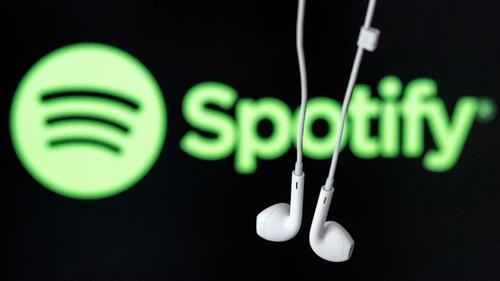Leftist Musicians, Record Labels Meltdown Over Spotify Allowing ICE Ads
Authored by Steve Watson via Modernity.news,
Streaming company Spotify is featuring ICE recruitment ads in between content on its free tier, prompting deranged leftists within the music industry to throw tantrums.
Bands and musicians including Massive Attack, Sylvan Esso, and King Gizzard And The Lizard Wizard have started campaigns to remove their songs from Spotify over the ads, with many of them also expressing anger at Spotify founder Daniel Ek investing in an AI military company called Helsing.
It’s the ads for ICE recruitment, however, that have triggered the most backlash.
Spotify has reportedly been running ICE recruitment advertisements in the US. pic.twitter.com/HumvkWJSAF
— Pop Crave (@PopCrave) October 13, 2025
The short ads encourage listeners to “join the mission to protect America” and apply to become an ICE agent.
Some of the ads are also directed toward police, stating, “In sanctuary cities, you’re ordered to stand down while dangerous illegals walk free.”
Indie label Epitaph Records complained last week on Instagram calling for Spotify to “remove these ads immediately.”
“Epitaph joins others in the independent music community calling on Spotify to remove ICE recruitment ads,” the record label demanded, adding “Artists and fans deserve platforms that reflect the values of the culture they sustain.”
A band called Thursday also decrees that Spotify “remove any and all” ICE recruitment ads from its platform, “immediately.”
“Thursday is an independent band and we join the wider independent musical community calling upon Spotify to remove any and all ICE recruitment advertising from its platform,” the band said.
It encouraged others to get on board, proclaiming, “A single voice is tiny but collective action is mighty.”
What they don’t say is exactly why they want ICE ads removed, and that’s because they don’t want to see illegal aliens, many of them gangbangers and violent criminals, brought to justice.
Whether that’s because of complete ignorance of the reality of the situation with crime and degradation in metropolitan areas or because they’re extreme leftists captured by ideological propaganda is up for debate. It’s probably a mixture of both.
All your favorite streaming services are serving up ICE Ads
HBO Max, Pandora, Spotify, and more have been running recruitment ads from the Department of Homeland Security for monthshttps://t.co/mUvqqcDE2B
— Rolling Stone (@RollingStone) October 15, 2025
Spotify has addressed the situation, pointing out that the ICE advertisements are “part of a broad campaign the U.S. government is running across television, streaming, and online channels,” and that the ads in no way violate the company’s policies.
A spokesperson also outlined that Spotify users have the option within their accounts to effectively down vote or block entirely the ads on their personal feeds.
CANCELLED. @Spotify, you lost me with the ICE Recruitment Ads, you don’t deserve my $. Bye 👋 pic.twitter.com/4EdOKWXrl7
— JP (@american_lex) October 14, 2025
after 10 years i’ve made the switch from spotify to apple music
displaying ICE ads and their refusal to ban AI artists was the nail in the coffin pic.twitter.com/o3o7uXolMN
— newhaven 🌿 (@imnewhaven_) October 15, 2025
After learning that Spotify doesn’t mind accepting money from a fascist government and supports running ads from a government agency (that shouldn’t exist) which is responsible for tearing apart families I’ve cancelled my Spotify subscription🖕Fuck ICE and fuck Spotify. pic.twitter.com/a6ksqfDCtC
— RJ (@MKENewYorker) October 21, 2025
Oh Lordt Nooooo!!! I’ve been paying for a @Spotify subscription for about 8 years & I loooove my Spotify!
Whyyyyyy are yall playing ICE ads???? I can’t believe I have to cancel it. pic.twitter.com/W8kVstgCfD
— Drink Water (@PromiscuousLadi) October 13, 2025
Many bands and singers already hate Spotify with a passion due to the minimal profits they earn from their music streams, a grievance rooted in the platform’s per-stream payout model.
For instance, Spotify pays an average of $0.003 to $0.005 per stream, meaning an artist needs millions of streams to generate substantial income—approximately 1 million streams to earn $3,000-$5,000.
Independent or mid-tier artists lack the massive fanbases of top-tier acts, and the issue is compounded by the fact that a significant portion of streaming revenue is split among rights holders, including labels, publishers, and distributors, often leaving artists with only 20-50% of the payout.
This has led to a perception that Spotify undervalues artistic work, fueling resentment among creators struggling to sustain their careers.
However, Spotify itself isn’t entirely to blame, as it operates within a complex and historically flawed music industry ecosystem. The company distributes roughly 70% of its revenue—$6.5 billion out of $9.3 billion in 2024—to rights holders, a payout ratio comparable to or higher than other streaming platforms.
Spotify must also cover operational costs, including licensing fees, infrastructure, and innovation, to remain competitive. The real issue lies in the broader music industry’s failure to adapt to technological advancements like digital distribution and streaming, which disrupted the once-lucrative model of physical album sales.
Piracy in the early 2000s decimated profits, forcing labels to lean heavily on streaming without restructuring contracts to fairly compensate artists. This systemic imbalance, not Spotify alone, perpetuates the struggle for artists to earn a living wage in the digital age.
Your support is crucial in helping us defeat mass censorship. Please consider donating via Locals or check out our unique merch. Follow us on X @ModernityNews.
Tyler Durden
Sat, 10/25/2025 – 10:30ZeroHedge NewsRead More





 R1
R1
 T1
T1


